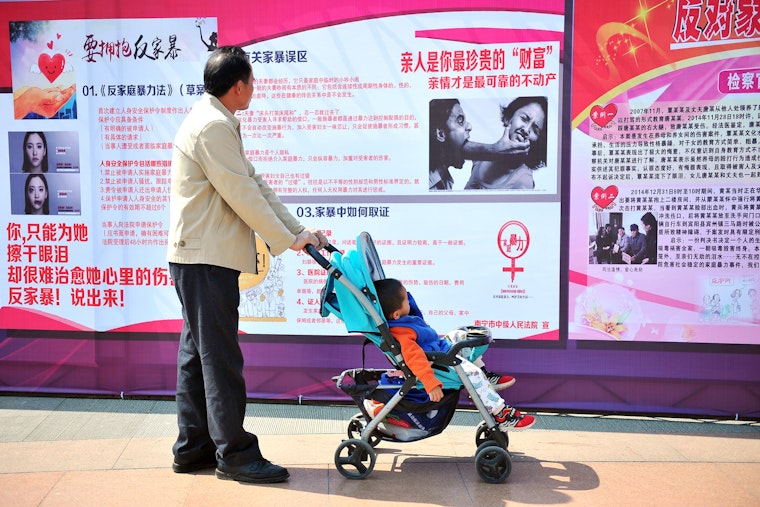To Be Effective, China’s New Anti–Domestic Violence Law Needs Civil Society’s Support
By Joy Chia

For Ms. Zhang (not her real name), violence was a fact of everyday life. She had endured countless acts of threatened and actual violence from her husband of eight years, violence that occurred both in their home city in Hebei Province, as well as across the provincial border, in Beijing, where Zhang worked.
Although her husband was convicted of battering her in August 2015, Zhang’s family persuaded her to drop her divorce application in December of that year. Meanwhile, the threats of violence continued unabated. In a country where both law and culture often turn a blind eye to family violence, Zhang had few places to turn to.
Then, in April, Zhang became the recipient of China’s first transregional personal protection order under the country’s new anti–domestic violence law. The new law gives victims of family violence the official support of the national government, offering personal protection orders for individuals facing violence within the family. In a break from traditional views, the legislation is a clear declaration that family violence is no longer simply a personal matter, but rather falls squarely within the purview of the state.
Family violence is all too common in China. National surveys indicate that almost a quarter of women have experienced violence within their marriages, more than 43 percent of children between 10 and 17 have suffered parental abuse, and 14 percent of those aged 65 and above have suffered abuse in the home. The new law provides an official structure for addressing and preventing family violence, while offering victims practical avenues for redress.
The passage of the law shows that civil society groups can still make an impact in China. The decades-long campaign for an anti–domestic violence law was largely driven by women’s rights activists, experts, and public interest lawyers, including many grantees of the Open Society Foundations. These activists painstakingly built a broad-based coalition that brought independent grassroots activists and NGOs, mainstream organizations, and the All-China Women’s Federation towards a common goal.
Years of successful pilot projects led by Chinese and international NGOs showed that specific procedures, like restraining orders and evidence collection by police and hospitals, play an important role in preventing further violence. And documentation by civil society actors showed how structural problems, like a lack of intra-agency coordination and poor record keeping, obstruct abuse victims from seeking protection and redress.
Public participation was also key in shaping the final iteration of the law. When the government invited feedback on the first official draft, more than 42,000 comments from almost 9,000 people were submitted, making it one of most publicly discussed Chinese laws ever. NGOs and independent experts also helped push forward important changes to the legislative text, which broadened the definition of domestic violence to include psychological violence and emotional harm, and to add cohabitants to the list of protected groups.
Nevertheless, significant gaps remain. Sexual violence, marital rape, and economic control are excluded from the law. It also does not cover divorced couples or former intimate partners. And it remains silent on whether legal protections would cover same-sex cohabitating couples, or forms of violence that disproportionately target minority groups. For example, LGBTI individuals who experience violence from their family members—be it through forced conversion therapy, commitment in psychiatric institutions, or restrictions on personal freedom—likely have little recourse under the law if they have reached the age of majority.
Two months after it went into effect, the law’s impact is still unclear. There have been few applications for personal protection orders, and domestic violence shelters remain mostly empty. Yet tragic cases of horrific abuse to which bystanders and community members failed to respond continue to emerge: an 11-year-old girl beaten to death by her father, a 23-year-old woman strangled by her husband while she was in the hospital recuperating from one of his beatings.
Breaking this culture of silence will require more than the law itself can provide. It will mean empowering individuals to use the antiviolence system to protect their rights. It will also require people to trust the very government institutions that have long failed to respond to allegations of abuse and requests for help.
Civil society actors could play critical roles in the law’s implementation, yet the space envisioned for independent NGOs is limited and shrinking. Between the law’s passage in December and its implementation less than four months later, Beijing Zhongze Women’s Legal Counseling and Service Center, a leading Chinese women’s rights organization whose work on domestic cases was pivotal to the passage of the law, was forced by government officials to close its doors because, according to some in the Chinese government, its work was considered to be too “sensitive.”
Now that the anti–domestic violence law has passed, the work of realizing its promise begins. Its success will depend on people like Ms. Zhang, whose willingness to seek official help is the first crucial step towards utilizing it. Building on the responsiveness of government departments is also key. And robust civil society involvement will only serve to strengthen this crucial endeavor for China’s abuse victims.
Joy Chia is a program officer in the East Asia Program at the Open Society Foundations.


